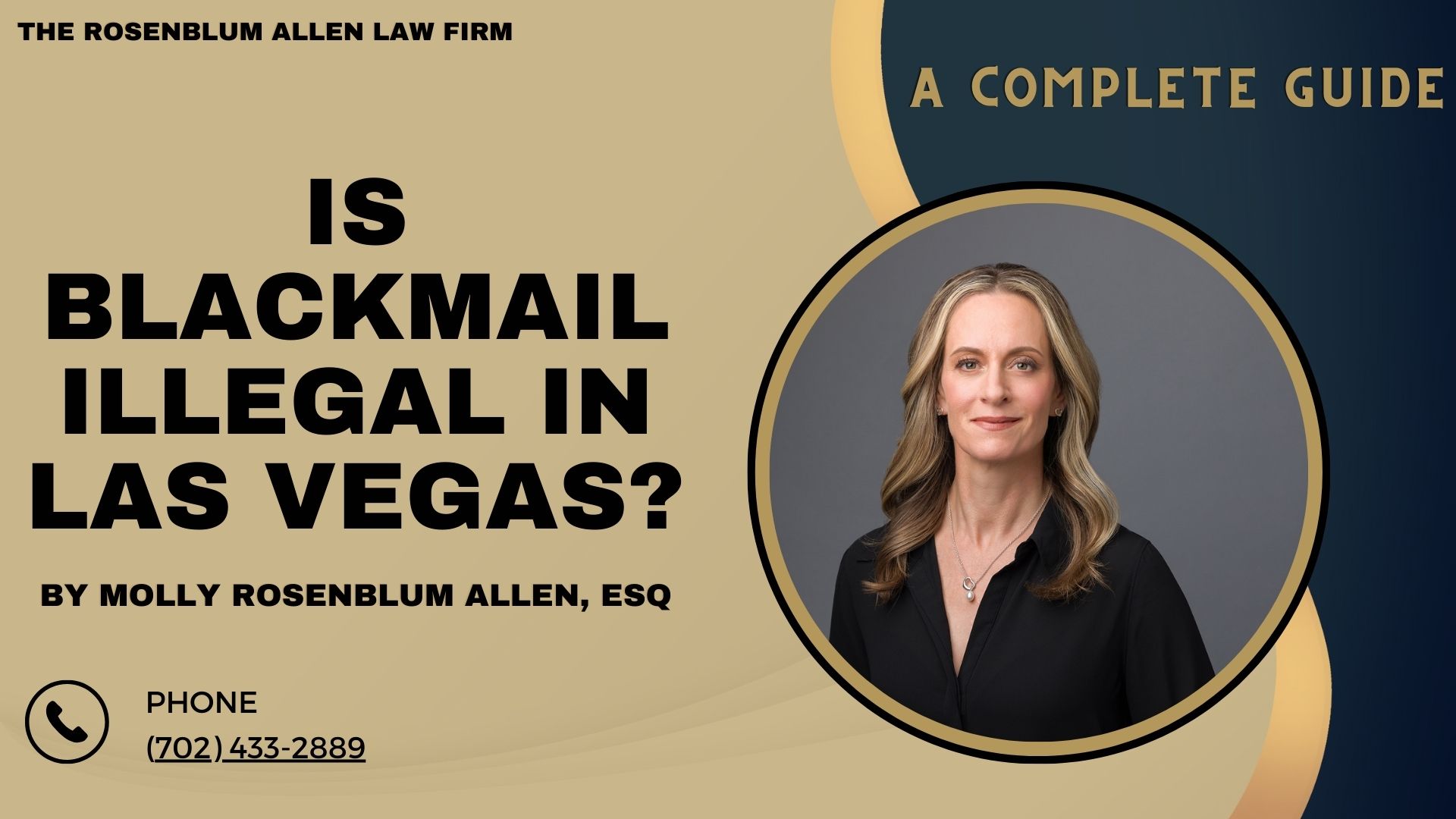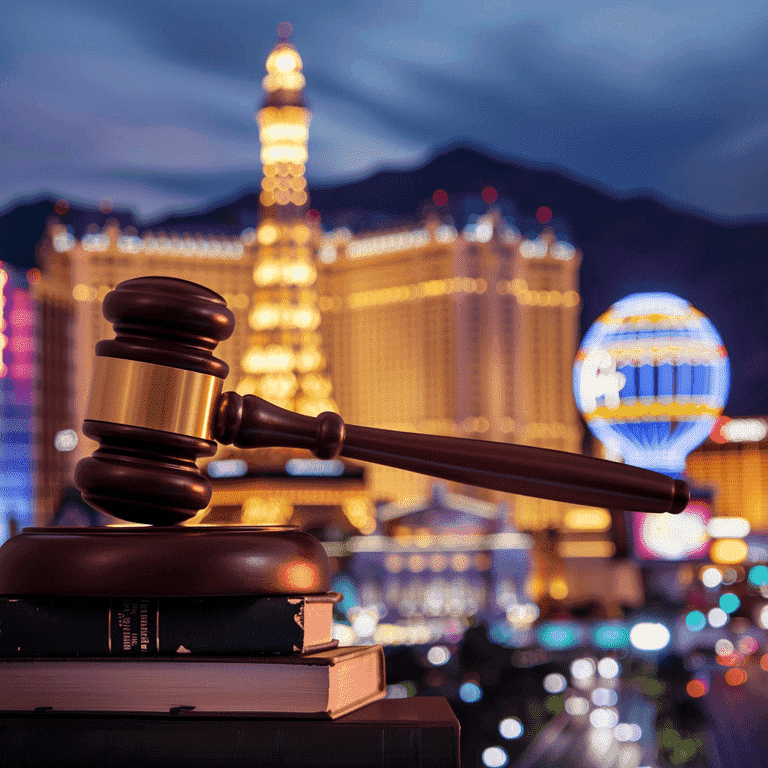Is blackmail illegal in Las Vegas?
Blackmail is not just a plot twist in movies or television dramas; it’s a real and severe criminal offense. Blackmail is demanding payment or another benefit from someone.
It’s in return for not revealing compromising or damaging information about them. Las Vegas residents and anyone else facing this situation must understand the legalities and consequences of blackmail.

 Understanding Blackmail
Understanding Blackmail
Definition of Blackmail
Blackmail is often portrayed as a shadowy exchange. It involves a demand for money or another form of compliance under threat of exposure. But legally speaking, it’s more complex. Blackmail involves threatening to reveal personal or damaging information about someone. This happens unless they meet specific monetary or other demands.
Distinction between Blackmail and Extortion
It’s easy to confuse blackmail with extortion, but they differ. Extortion is obtaining something, especially money, through force or threats. But, blackmail is a form of extortion. It involves explicit threats to reveal information.

The Legal Framework Surrounding Blackmail
Federal and State Laws About Blackmail
At its core, blackmail is about coercion, and both federal and state laws address this crime:
Federal Law: Federally, blackmail is covered under 18 U.S.C. § 873, which prohibits “blackmail” as a form of extortion.
State Law: In Nevada, state laws complement federal laws to ensure that those who engage in blackmail face legal consequences.

Blackmail Under Nevada Law
Nevada Revised Statutes on Blackmail
Nevada law is explicit when it comes to blackmail. The Nevada Revised Statutes (N.R.S.) outline what constitutes blackmail and what doesn’t:
NRS 200.380: This statute defines robbery, but under Nevada law, the threat of revealing secrets to secure the property of another can transform into robbery, akin to blackmail.
NRS 205.320: This statute explicitly mentions “extortion,” which, in Nevada, includes threats to publish a secret or expose a fact to defame someone or compel the person to do an act against their will.
The Severity of Blackmail Charges in Nevada
In the eyes of Nevada law, blackmail isn’t taken lightly:
Crime Classification: Blackmail can be charged as a misdemeanor or a felony, depending on the circumstances and severity.
Severity Factors: The severity may increase if the blackmail involves a public figure, large sums of money, or crosses state lines.

Potential Penalties for Blackmail in Las Vegas
Possible Legal Repercussions
If convicted of blackmail in Las Vegas, one might face:
Jail Time: Ranging from a few months for a misdemeanor to several years for a felony.
Fines: Potentially thousands of dollars.
Long-Term Consequences
Beyond immediate penalties, being convicted of blackmail can have a ripple effect on one’s life.
Criminal Record: A conviction becomes part of your permanent record.
Impact on the Future: This can affect future employment opportunities, relationships, and housing options.
In the following sections, we’ll delve deeper into the defenses against blackmail charges. We’ll also cover the legal prosecution process and the steps to take if you’re accused. Remember, the situation may seem dire. The law provides a robust defense to ensure fair justice.

Legal Defenses Against Blackmail Charges
Common Legal Defenses in Blackmail Cases
Facing blackmail charges can be daunting. However, depending on the circumstances, one can employ several defenses.
Insufficient Evidence: The burden of proof is on the prosecution. If they can’t prove the accused made a threat with the intent to blackmail, the case may not stand.
Intent: If it can be shown that there was no intent to threaten or coerce, this could be a valid defense.
Mistake of Fact: Sometimes, a person may be accused of blackmail when they have a legitimate claim to the information or payment they sought.
How a Defense Attorney Can Help
A skilled defense attorney can navigate through the complexities of the law:
Evaluating the Case: They’ll look at the evidence, identify weaknesses in the prosecution’s case, and develop a strategy.
Negotiating Plea Deals: If the evidence is strong, a defense attorney may be able to negotiate lesser charges.

The Process of Legal Prosecution for Blackmail
Investigation and Evidence Gathering
Long before a courtroom is seen, the legal process begins.
Law Enforcement’s Role: Police will investigate the allegations, which may involve digital forensics to recover communications.
Examination of Communication Records: Texts, emails, and other communications will be scrutinized for blackmail evidence.
The Role of the Prosecutor
The prosecutor’s job is to prove the crime beyond a reasonable doubt:
Filing Charges: Based on the evidence, the prosecutor may file charges.
Pre-Trial Actions: Before trial, there may be hearings where a defense attorney can challenge the prosecution’s case.

What to Do If You’re Accused of Blackmail
Immediate Actions to Take
If you find yourself accused of blackmail, taking immediate steps can make a significant difference.
Seeking Legal Counsel: Consult a defense attorney as soon as possible.
Understanding Your Rights: Know that you have the right to remain silent and the right to an attorney.
Dealing with Law Enforcement
Interacting with law enforcement requires caution:
Remaining Silent: You’re not obligated to speak to the police beyond identifying yourself.
Navigating Interrogations: An attorney can advise you on how to handle police questions.
Remember, charging someone with a crime does not mean they are guilty. The law ensures that you have the opportunity to present your side of the story. In the following sections, we’ll look at the resources and support available to individuals charged with blackmail. We’ll emphasize that help is available and that a charge does not define a person’s life.

Resources and Support for Individuals Charged with Blackmail
Legal Support Services in Las Vegas
If you’re charged with blackmail in Las Vegas, there are various resources to support you through this challenging time:
- Public Defenders: If you can’t afford private counsel, the court will appoint an attorney for you.
- Private Law Firms: With a range of expertise, private attorneys can offer more personalized defense strategies.
| Type of Legal Support | Description | Pros | Cons |
|---|---|---|---|
| Public Defender | Court-appointed attorney | Cost-effective, Experienced with a variety of cases | May have a heavy caseload |
| Private Law Firm | Privately hired attorney | Personalized attention, Specialized expertise | Can be expensive |
Counseling and Rehabilitation Programs
Dealing with the stress of criminal charges is tough, but you don’t have to do it alone:
- Counseling Services: Mental health professionals can help you cope with the emotional toll.
- Rehabilitation Programs: If your situation involves substance abuse, rehabilitation programs can be a step towards recovery.
| Support Services | Benefits | How to Access |
|---|---|---|
| Counseling | Emotional support, Coping strategies | Through referrals or legal support services |
| Rehabilitation | Address underlying issues, Support for recovery | Court programs or private facilities |
Facing blackmail charges can be a tumultuous experience, but with the right information and support, you can navigate the legal system more confidently. The legal community in Las Vegas offers a range of services to assist you through each step of the process, from understanding the charges to finding the best defense strategy. It’s important to remember that seeking help is a sign of strength, not weakness, and it’s the first step toward taking control of your situation.
Why You Have Not Hired a Felony Defense Attorney Yet
Watch this short video to take the next big step toward defending your rights against a felony charge.

Breaking It All Down
In conclusion, blackmail is a severe criminal offense in Las Vegas. It is also in the rest of Nevada and under federal law. If you or someone you know is facing charges, it’s essential to understand the seriousness of the situation. You should also know the potential consequences that may follow. But, it is equally important to remember that charges do not equal guilt. The legal system is designed to protect the rights of the accused.
Here’s a recap of the key points to remember:
Legal Definitions Matter: Understanding the difference between blackmail and other similar offenses like extortion can clarify the charges you might be facing.
Know the Law: Familiarize yourself with Nevada’s legal statutes concerning blackmail. Knowledge is power when facing legal challenges.
Penalties Are Serious: Recognize the potential for significant penalties, but remember that the exact consequences depend on the case’s specifics.
Defense Strategies Are Crucial: An experienced defense attorney can make a difference in exploring all possible legal defenses and mitigating the consequences.
Process and Procedure: The legal process from investigation to potential trial is complex, but knowing what to expect can alleviate some stress.
Exercise Your Rights: If accused, exercise your right to remain silent and seek legal counsel immediately. This can’t be stressed enough.
Support Systems Exist: Utilize the available resources, whether you opt for a public defender or private attorney, and don’t hesitate to seek counseling or join rehabilitation programs if necessary.
Facing blackmail charges can be lonely. But, Las Vegas has a strong legal system and support network. They can help you navigate these troubled waters. Remember, a charge begins a legal process, not the end of the road. With the right approach and help, you can address the situation head-on. You can work towards a fair and just resolution.
Stay informed, stay focused, and take it one step at a time. Your journey through the legal system may be challenging, but it’s a path you don’t have to walk alone.

More Frequently Asked Questions
What should I do if I’m falsely accused of blackmail?
If you find yourself falsely accused of blackmail, your first step should be to contact a defense attorney immediately. Even if the allegations are untrue, having legal representation is crucial to navigating the situation effectively.
Can someone be charged with blackmail for threatening to expose a crime?
Yes, even if the information involves criminal activity, using it as leverage for personal gain constitutes a criminal offense and can lead to blackmail charges.
Does it matter how I communicated the threat for it to be considered blackmail?
No, blackmail can occur through any form of communication, whether it’s written, verbal, or electronic.
If I didn’t receive any money or benefits, can I still be charged with blackmail?
Yes, if you threatened someone with the intent to obtain money or benefits, you can still face blackmail charges, regardless of whether you actually received any benefits.
Are there any particular laws for cyber blackmail in Las Vegas?
Yes, both state and federal laws cover cyber crimes, including online blackmail. These laws address unauthorized access, data theft, and other internet-related offenses.
How can I prove that I did not intend to blackmail someone?
Evidence such as communication records, witness testimony, and the context of the interaction can demonstrate a lack of intent to blackmail.
Can deleting incriminating messages protect me from blackmail charges?
No, deleting messages can be considered obstruction of justice. Digital forensics can often recover such communications, so it’s essential to refrain from tampering with evidence.
What happens if the victim initiates the exchange, leading to the blackmail accusation?
The context of the initiation and the response will be critical in determining whether the situation constitutes blackmail. If someone used the exchange as a threat for personal gain, they may still be considered blackmailing.
Can I be charged with blackmail if I threatened to report someone to the authorities for a legitimate crime?
If the threat of reporting a crime is contingent upon receiving a benefit in return, it could be considered blackmail. Reporting a crime should not be used as leverage for personal gain.
How long do prosecutors have to bring charges against someone for blackmail?
The statute of limitations for blackmail varies depending on whether it’s charged as a misdemeanor or a felony. Generally, the statute of limitations allows prosecutors a specific period to bring charges, after which they may be barred from doing so.
What kind of evidence is typically used to prosecute blackmail cases?
Evidence commonly used in prosecuting blackmail cases includes recorded communications, witness testimonies, financial records, and any other documentation that supports the occurrence of blackmail.
Is it blackmail if I threaten to sue someone unless they pay what they owe me?
Threatening legal action for a legitimate claim is not considered blackmail. Blackmail occurs when someone threatens harm or negative consequences unless they receive something of value in return.
If I’m guilty of blackmail, should I negotiate a plea deal or go to trial?
The decision to negotiate a plea deal or go to trial should be made in consultation with your attorney. Factors to consider include the strength of the evidence against you and the potential consequences of each option.
Are there any privacy laws that protect the information I share with my attorney about my blackmail case?
Yes, attorney-client privilege protects most communications between you and your attorney, including those related to your blackmail case. This privilege ensures that your discussions remain confidential.
Can I be extradited to Las Vegas if I’m charged with blackmail but live in another state?
If the alleged blackmail has connections to Las Vegas, you could potentially be subject to extradition to face charges there. Extradition laws vary by jurisdiction, so it’s essential to consult with a legal expert familiar with the relevant laws and regulations.

Glossary
Blackmail: A crime involving making threats to disclose information about a person, typically to extract money or other benefits.
Extortion: The practice of obtaining something, especially money, through force or threats, which can encompass blackmail when it involves the threat of revealing information.
Federal Law: Laws enacted by the national government of a country. In the context of blackmail, it refers to the statutes that address this crime at the national level.
State Law: Laws that are enacted and enforced by individual states. State laws on blackmail can vary and are in addition to federal laws.
Nevada Revised Statutes (NRS): The codified laws of the State of Nevada outline the state’s statutes, including those on blackmail and related offenses.
Crime Classification: The categorizing of a crime as a felony or misdemeanor based on its severity determines the penalties that may be imposed.
Misdemeanor: A lesser criminal act, typically punished less severely than felonies.
Felony is a more serious crime, usually punishable by imprisonment for more than one year or death.
Prosecution: The legal party responsible for presenting the case in a criminal trial against an individual accused of breaking the law.
Defense Attorney: A lawyer specializing in the defense of individuals and companies charged with criminal conduct.
Plea Deal: An agreement in a criminal case between the prosecutor and defendant, where the defendant agrees to plead guilty to a particular charge in return for some concession from the prosecutor.
Investigation: Collecting facts and evidence to ascertain the truth to identify and charge a potential suspect.
Digital Forensics: The recovery and investigation of material found in digital devices, often used in investigating cybercrimes, including cyber blackmail.
Burden of Proof: The obligation to prove one’s assertion in legal proceedings, which lies with the prosecution in criminal cases.
Statute of Limitations: A law that sets the maximum time after an event within which legal proceedings may be initiated.
Obstruction of Justice: Obstructing prosecutors or other (usually government) officials. Common law jurisdictions other than the United States tend to use the broader offense of perverting the course of justice.
Attorney-Client Privilege: A legal privilege that works to keep confidential communications between an attorney and their client secret.
Extradition: The action of deporting a person accused or convicted of a crime, which is the formal process by which a fugitive found in one country is surrendered to another country for trial or punishment.

Additional Resources for You
As you navigate through the complexities of the legal system, it’s important to have access to reliable and informative resources. Our lead attorney, Molly Rosenblum, Esq., has curated a selection of valuable materials to assist you in your time of need. These resources have been designed to provide clarity and guidance on various legal topics that you might encounter. Here’s a quick guide to these resources:
Double Jeopardy: Understand the protections against being tried for the same crime twice. Read more
Hung Jury: Discover what happens when a jury cannot reach a unanimous decision. Explore here
Circumstantial Evidence: Learn about the role of indirect evidence in proving a defendant’s guilt. Learn more
Indicted Vs Charged: Find out the difference between being indicted and being charged with a crime. Understand the differences
Difference Between Jail And Prison: Get to know the distinctions between these two types of incarceration. See the comparison
What Are Miranda Rights: Familiarize yourself with the rights that are read to you when you are arrested. Know your rights
How To Check If You Have An Outstanding Warrant: This guide provides the steps to check for any outstanding warrants against your name. Check now
What To Look For In A Criminal Defense Lawyer: Learn what qualities are important when choosing legal representation. Find out here
Possible Ways To Reduce A Felony Charge: Explore strategies that might reduce the severity of a felony charge. Read about reduction strategies
Should You Accept A Plea Bargain: This resource will help you weigh the pros and cons of accepting a plea deal. Make an informed decision
Leverage these resources to gain a better understanding of your situation and to make informed decisions about your case. Remember, knowledge is the first step towards empowerment in any legal challenge.

Outside Resources for You
American Bar Association: A comprehensive resource providing insights on various legal topics and access to legal support. Visit ABA
FindLaw: Offers a wealth of legal information, including a section dedicated to criminal law. Explore FindLaw
Nolo: Known for its extensive library of legal articles and DIY legal guides. Check out Nolo
Justia: Provides free case law, codes, regulations, and legal information for lawyers and consumers at all levels of interest. Go to Justia
Avvo: Offers a Q&A forum where you can ask legal questions and get answers from lawyers, as well as legal guides. Visit Avvo
National Association of Criminal Defense Lawyers (NACDL): An organization that advocates for fairness in the criminal justice system and provides resources for criminal defense lawyers. Explore NACDL
The Innocence Project: Works to exonerate the wrongly convicted through DNA testing and reforms the criminal justice system to prevent future injustice. Learn about The Innocence Project

A Special Message from Our Lead Attorney, Molly Rosenblum Allen, Esq

Dear Reader,
Thank you sincerely for taking the time to explore our resources. We hope you found the information insightful and empowering as you navigate your legal journey. At The Rosenblum Allen Law Firm, we understand the complexities and the emotional weight legal challenges can bring into your life. Our commitment is to provide legal representation, guidance, and support to those who need it most.
If you have any questions about your specific situation or seek legal advice tailored to your unique circumstances, we invite you to reach out. I, Molly Rosenblum Allen, Esq., and our dedicated team are here to help you understand your rights and the best course of action moving forward.
Please call us at (702) 433-2889 to schedule your free consultation. This initial consultation will allow us to learn more about your case and provide you with an overview of how we can assist.
Thank you again for entrusting us with your time. We look forward to the opportunity to serve you.
Warm regards,
Molly Rosenblum Allen, Esq.



